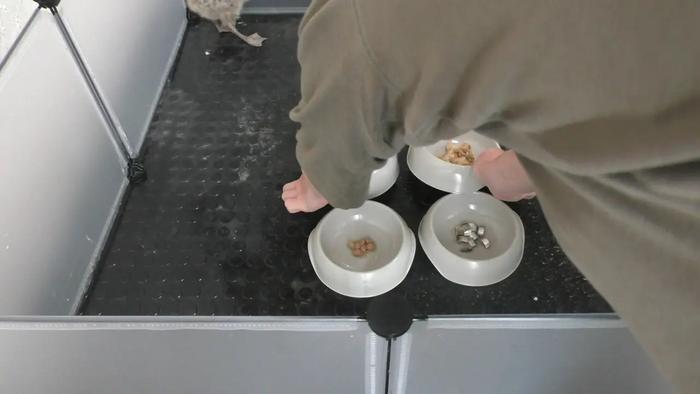Seagull chicks raised on an “urban” diet still prefer seafood, new research shows.

Credit: Emma Inzani
Seagull chicks raised on an “urban” diet still prefer seafood, new research shows.
University of Exeter scientists studied herring gull chicks that had been rescued after falling off roofs in towns across Cornwall, UK.
Raised in captivity (before being released), they were given either a “marine” diet consisting mainly of fish and mussels, or an “urban” diet containing mostly bread and cat food.
Every few days the gull chicks were presented with a choice of all four foods in different bowls, to test which they preferred – and all gulls strongly favoured fish.
“Our results suggest that, even when reared on an ‘urban’ diet of foods found only around people, these chicks might be unlikely to seek out urban foods as adults,” said lead author Emma Inzani, from the Centre for Ecology and Conservation on Exeter’s Penryn Campus in Cornwall.
“Human-associated foods are often both reliably present and easy to obtain – but when fish is available they clearly prefer it.”
Herring gulls are often seen as a pest in urban areas, where they scavenge for dropped food and in bins, and sometimes take food from people.
However, the species is on the UK’s List of Highest Conservation Concern due to ongoing population declines.
Inzani said a combination of reduced fish stocks in UK waters – coupled with abundant and easy access to food waste in towns – may mean it is not as profitable for gulls to spend a lot of energy going out to sea to forage.
Previous research has shown that parent gulls often switch to finding more seafood once their chicks hatch, possibly due to seafood providing more of the nutrients chicks need to grow.
In this new study, all 27 chicks had access to food all day, but half of the chicks had urban food for 80% of the day and seafood for 20%, while the other half of the chicks received the opposite diet.
When presented with all four foods together on days 5, 10, 15 and 35 of the study, both groups consistently favoured fish – and even those that tried the bread rarely ate much of it.
Chicks’ preferences for fish found in this study may reinforce the behaviour observed in parent gulls to switch to provisioning more marine-sourced foods upon chick hatching.
“Animals can live and exploit urban areas for human food waste,” said senior author Dr Neeltje Boogert.
“However, this does not necessarily mean they’re thriving or that they prefer this food, rather than making the best of a bad situation.
“More research is needed to investigate how the food young animals receive affects their later life, including their food choices, health and breeding.”
The study was funded by the Natural Environment Research Council and the Royal Society.
The paper, published in the journal PeerJ, is entitled: “Early-life diet does not affect preference for fish in herring gulls (Larus argentatus).”
Journal
PeerJ
DOI
10.7717/peerj.17565
Article Title
Early-life diet does not affect preference for fish in herring gulls (Larus argentatus).
Article Publication Date
11-Jul-2024




